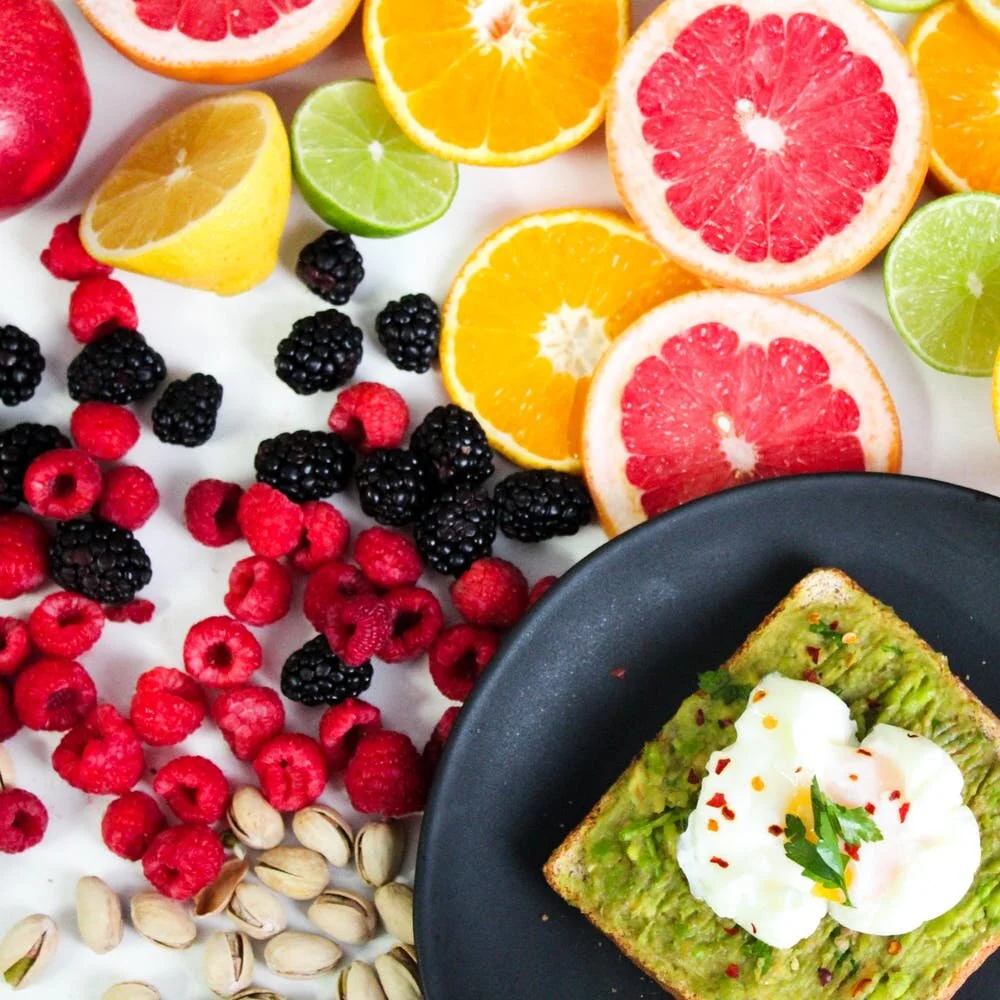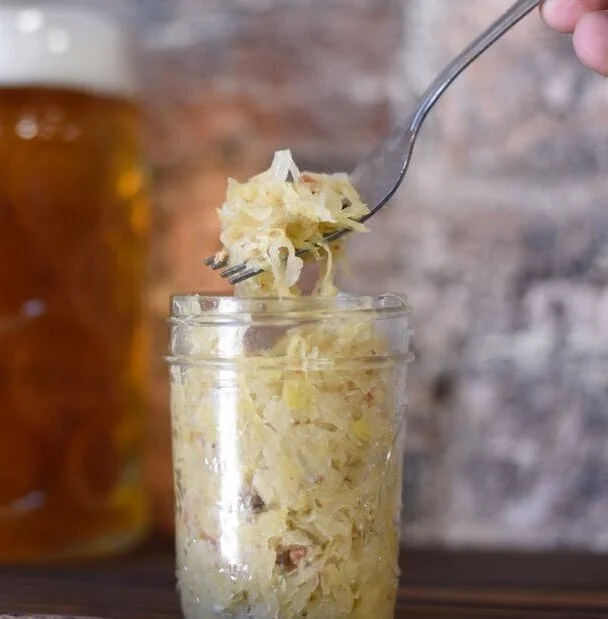You’re probably heard me say this many times but I’ll say it again: A HEALTHY GUT IS KEY FOR A HEALTHY LIFE. Your gut health is linked to everything.
The gut microbiome (the bacteria in your gut) is all the rage in the health world now for good reason. For starters, studies have shown how big and important it is. There are trillions of different bacteria in our intestines (aka GI tract), more than the number of cells in our bodies.
We also know that a large part of your IMMUNE SYSTEM is in your gut. And that your gut has its own NERVOUS SYSTEM (AKA second brain) which communicates with your brain and affects your mood and mental health.
And the microbiome doesn’t just exist in our gut. There are tons of bacteria cells in your mouth, skin, lady parts …. They all have their own microbiome, and they’re all linked.
So taking care of your GUT HEALTH will help improve the health of your skin, your mouth, your genitals, it helps improve the health of your immune system, nervous system and brain!
HOW DO WE KNOW WHEN OUR GUT NEEDS SOME HEALING?
When our gut bacteria is out-of-balance, when we have more “bad” bacteria than “good” bacteria (to put it simply), this can cause issues for our overall health and wellness.
Some symptoms you may experience when your gut is out of balance include:
GI symptoms: gas, bloating, irregular bowel movements (constipation, diarrhea or combination of both), heartburn symptoms
Skin symptoms: rashes, eczema, scalp issues
Mouth symptoms: white film on the tongue
Energy/mood symptoms: fatigue / exhaustion, mood swings, headaches
Immune symptoms + fungus: easily get sick, recurrent yeast or urinary infections, toenail fungus
If you have any of the above symptoms, you may have an imbalance in your gut (sometimes called Gut Dysbiosis) and/or Candida overgrowth.
What can you do to start?
Make a few tweaks to your diet (for at least 4 weeks, ideally 6-8 weeks) to crowd out the bad bacteria and encourage the growth of the beneficial bacteria.
And if this works for you, I encourage you to keep up with these dietary changes as a longer term LIFESTYLE (at least to a 90% degree) to avoid gut issues from recurring. Below I list top 5 foods to avoid, 5 foods to minimize and 5 foods to enjoy.
Here are 5 foods that you can try AVOIDING:
Added sugars. Sugar is highly inflammatory and the key food group to avoid when dealing with gut issues, such as IBS, Gut dysbiosis or Candida. READ INGREDIENTS and avoid anything with added sugar / sucrose/ fructose in the ingredient label. Read more HERE for tips of lowering your sugar. Watch out for sweetened sauces, dressings, drinks, yogurt, desserts/baked goods
Alcohol. It has a high sugar content that can feed the bad bugs and its fermentation /yeast can contribute to candida.
Dairy products, including milk, cheese, cream, yogurt and any/all processed or cooked foods containing dairy. Note: for some people, small amounts of lower-lactose dairy is ok, such as hard cheese, unsweetened organic yogurt and kefir, but I generally recommend to start avoiding just in case.
Refined carbohydrates. Avoid processed/packaged pasta, bread, pastries/baked goods (pies, empanadas, anything with dough).
Gluten. Many studies find that gluten (a protein found in wheat, rye and barley, and which is added to so many products nowadays) can create inflammation in the gut, and can also contribute to leaky gut (a condition where your intestinal barrier is weakened and food particles leak into your blood and can lead to food sensitivities).
You may want to MINIMIZE (or in some cases avoid) these 5 foods:
Legumes including beans, lentils, chickpeas, peas, soybeans, peanuts *
High starch vegetables including potato, yuca, quequisque, malanga, sweet potato/yam, beets and corn – which is technically a grain anyway
High-sugar fruits including bananas, grapes, dried fruits some tropical fruits
Foods high in LECTINS including rice, nightshade vegetables (potatoes, eggplant, tomatoes, peppers) and some foods mentioned above such as legumes and dairy
Any other potential trigger foods / food sensitivities. If there are foods that you suspect you may have a sensitivity towards (common ones include soy, eggs, shellfish, peanuts and .other tree nuts) it’s worth it to avoid these temporarily for your gut healing. Keeping a food-symptom diary, doing a stricter elimination diet and/or trying a food sensitivity test can help determine what’s affecting you.
*Note on legumes: beans/lentils/chickpeas etc can also be great for gut health given their nutrient density and fiber, so this is case by case. Sometimes its ideal to remove them for a while as part of a gut-healing protocol to see if they create issues for you, then add them back in gradually and keep them in your diet in small amounts as they are super gut-healthy foods in most cases.
WHAT SHOULD YOU EAT? Here are 5 top foods to enjoy:
Non-starchy vegetables, especially leafy greens – tons and tons (basically all vegetables except for those listed above to minimize) including fresh herbs (like basil, parsley, cilantro, dill, rosemary, mint, etc)
Low glycemic fruits like berries. In most cases it’s also great to enjoy (in small amounts) fruits such as: citrus, kiwis, plums, peaches, apples, pears, papaya, coconut, avocado.
Healthy fats, including:
extra virgin high quality oils (EV olive oil/coconut oil/avocado oil)
seeds (like sunflower, pumpkin, hemp, chia, flax)
nuts (like almonds, pistachios and walnuts)
avocado, coconut
bone broth
Animal protein (high quality) including organic eggs and chicken, wild-caught fish and seafood, grass-fed beef and lamb *Note: some people have slight sensitivity to eggs so its best to first make sure that’s not your case. If it is, avoid eggs!
Gluten-free grains (in small amounts) like quinoa, millet, oats, amaranth, buckwheat and teff. *Note on grains: in some cases, it’s best limiting or even avoiding them all together, however i find that leaving them in small amounts is usually of more benefit (and it helps maintain a balanced diet)
And once you’ve started your gut healing journey by tweaking your diet, I also recommend adding in PROBIOTIC-RICH foods such as organic raw sauerkraut, kimchi, miso, tempeh, apple cider vinegar, kombucha (be wary of sugar and caffeine though), dairy-free yogurt (coconut yogurt is my favorite) and kefir (preferably a dairy-free version such as coconut water kefir). Taking a probiotic supplement can also be beneficial. This is the best way to replenish your “good” gut bacteria.
Just note that there are some cases where its best to wait until you’ve removed some of the bad bacteria and improved your gut condition before starting with the probiotics; each case is different so its best to work with a health practitioner here.
CONCLUSION
If you’re experiencing gut symptoms and want to try healing your gut, following these recommendations of foods to avoid vs. enjoy can be a great starting point.
That being said, sometimes a stricter protocol is necessary, especially in the case of SIBO (small intestinal bacterial overgrowth) and/or more extreme cases of IBS that may require a stricter Low-FODMAP diet for a few weeks, for example. For more on this, feel free to CONTACT ME. And always make sure to check with you doctor before making any big dietary changes especially if taking medications.
Love and Healthy Gut Choices,
Mariana



